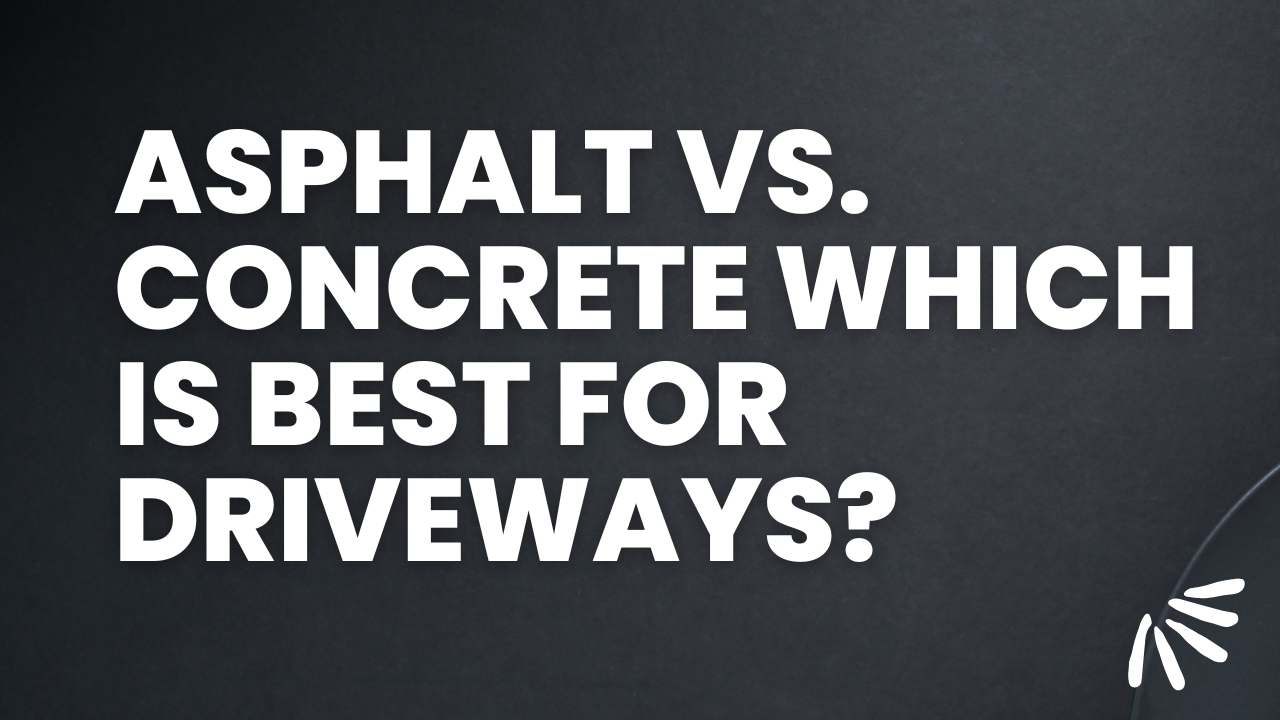What do you think is the most robust driveway material? Do you often incline towards asphalt for its resilience? Or do you pick concrete for its ability to remain intact forever?
The choice between the two is as confusing as the above statement. In fact, it is now alarming and brings attention to choosing the right driveway material. When the choice is between asphalt and concrete, you also have to consider its cost, adaptability to the driveway traffic, and long-term value.
Whether you are a homeowner, business owner, or a real estate contractor specialising in concrete or asphalt driveways in Melbourne, this blog will provide insights on finding the right material.
Asphalt and Concrete: Understanding Materials That Make Them Strong
Asphalt Composition:
Asphalt is a combination of sand, gravel, crushed stone, and bitumen. A bitumen is one of the petroleum forms that looks black, liquid, and has a sticky appearance. Each of these aggregates in asphalt mixes together to create a strong driveway material.
As the process of using asphalt for driveways requires considerable efforts, taking assistance of contractors specialising in asphalt driveways is crucial. Professionals heat the asphalt, apply the first layer on the prepared surface, and level it to create a smooth surface.
Concrete Composition:
Concrete composition for driveways combines an appropriate mix of cement, water, sand, and aggregates. Residential and commercial concrete contractors in Melbourne begin the process with preparing the flat sub-base. Then, they make a frame around the edges of the driveway area to keep the liquid concrete in place.
The wet mixture of concrete is finally put into the moulds and flat out. As it heals after a few hours, the concrete driveway takes its shape, turning strong enough to sustain the weight of vehicles.
Factors That Decide Stronger One Between Asphalt and Concrete
1. Aesthetics:
The appearance of a driveway adds value to your home’s or business’s market value. It also puts a good impression in the minds of visitors arriving at home or business.
Asphalt:
Asphalt driveway looks clean black and attracts the eyes, if you prefer sleek and uniform design. It lays flat on the surface and looks like a black paint on the floor after the final finish. With no colours available, the material lacks aesthetic flexibility. However, its clean and neat appearance is enough for owners who prefer clean slate.
Concrete:
Concrete has many advantages over asphalt when it comes to customisation. Choosing commercial concrete contractors in Melbourne who can add colours, finishes, and create patterns based on your preference is all you need.
Alternatively, many contractors also choose between stamped, stained, and patterned concrete since they are easily available in the Melbourne’s market. Keeping an eye on what interests your aesthetic preferences can make a big difference.
2. Durability:
Asphalt:
Asphalt lasts for 15-20 years. As long as you are maintaining and sealing the asphalt driveway regularly, its longevity can last for a few more years. However, the end of its lifespan can result in oil stains, damages, and repair requirements.
Concrete:
Concrete can live for over 30 years and till the end of 4 decades. Its long-term durability is understandable because it can resist stains, heavy load, and can go without frequent maintenance.
3. Installation time:
Asphalt:
Asphalt is more quicker to install than concrete. If you need a functional driveway in less than a week, asphalt driveways cure at a speed.
Concrete:
If time is not a factor and you can easily wait for over a week, concrete is the favourable choice. Commercial concrete contractors in Melbourne can take the curing process in such a way to avoid any delays. It is best to first inspect the nature of the concrete before using it on driveways.
4. Environmental Impact:
Asphalt:
The production process and installation of asphalt on the driveway can be a setback for the environment. Specifically, because it involves the use of petroleum-based bitumen. Despite that, choosing contractors who can use reclaimed asphalt pavement or eco-friendly recycled ones as an alternative can help in reducing the impact.
Concrete:
Concrete has no significant ecological footprint. However, the production process can emit CO2 fumes which can be discouraging for the landscaping and natural vegetation. Instead, you can use fly ash as it recycles after every use.
When Should You Choose Asphalt or Concrete Driveway?
Choosing between asphalt and concrete as a material for designing commercial driveways depends on your specific needs and situations. Here are some factors that determine the right situation and timing for installing an asphalt or concrete material.
Budget Constraints:
Asphalt:
Asphalt is an economical option as compared to other driveway materials. However, the low-cost asphalt takes up costs on the regular sealing after every few years. This means that if you have time and budget to maintain its appearance, choosing asphalt should not be a problem.
Services like asphalt driveways in Melbourne are easily available, however, choosing a contractor who can include a free maintenance plan in the project agreement is a wise decision.
Concrete:
Concrete is more expensive than asphalt but it can maintain its shape and appearance without extra effort from your end. If you are looking for a long-term value out of your first investment, then concrete is the best choice.
Make sure that the cost of making concrete driveways should not take a toll on other considerations. Contractors in Melbourne can advise on making the most of the investment.
Consider Seasons:
Asphalt:
It is best to have your contractor design asphalt driveway in warmer months. Temperatures ranging from 70 degree Fahrenheit to 90 degree Fahrenheit is suitable for curing the asphalt. When the temperature is neither too hot nor too cold, it gets easy to level the concrete and prevent the likely cracks.
Generally, contractors do not recommend designing an asphalt driveway during colder months. Because cold environments make asphalt not adhere to the sub-base evenly.
Concrete:
If you are choosing concrete, both warm and cold climates work well with the material. During warmer months, the chances of concrete cracking can get a bit high. Mainly due to the fact that the concrete mixes contain water content that evaporates quickly in hot weather.
However, commercial concrete contractors can take steps to mist the surface or cover it with a blanket safely. As a result, the final concrete layer comes out strong for many years. In colder months, professionals choose to use additives with concrete or cover it up with a blanket. Ultimately, it might take longer to cure but the safe measures can bypass the damage.
Final Words
We hope you liked reading this blog. Clearly, there are many factors that influence your choice between asphalt and concrete material for driveways in Melbourne. Leaving the choice in your hands, we can interpret that whether you choose concrete or asphalt driveways in Melbourne, each has its pros and cons.
If asphalt is non-expensive, looks attractive, and is restorative right after installation, then concrete adapts to customisation, adds durability, and has a worth for the price. Choosing any one material for driveway ultimately depends on your location, climate needs, and personal preferences. Contact Roadseal Civil for best efficient services today.



